- Home
- Nevil Shute
The Breaking Wave Page 2
The Breaking Wave Read online
Page 2
“They did?”
“I think so, Mr. Alan.” He paused, and then said awkwardly, “I thought you ought to know, case you might say anything rough about her, not knowing.”
I nodded. “Thanks for telling me.” We drove along in silence while I thought this over. “If she was happy in the place whatever made her go and do a thing like that?”
“I dunno, Mr. Alan,” he replied. “I dunno what makes girls go and do the things they do.”
I sat silent, thinking all this over. If my mother had grown attached to this girl it made things so much the worse, and nothing was more likely if she was a decent girl. My mother was now crippled with arthritis and could not get about very much, so that she met few people and perhaps was rather lonely, which was one of the reasons why I had come home. In a big house like Coombargana that must be run with indoor servants, unsatisfactory servants can be a continual worry and a nuisance to a woman in my mother’s state of health, and they had had a long succession of married couples who had come for a few days and departed without notice because the place was too isolated, or had quarrelled with Annie our old cook, or had got drunk, or had stolen things. If in the end a girl had turned up who worked happily at Coombargana and made no trouble it was very likely that my mother would have grown to depend on her and might even have treated her more as a companion than as a servant. An English girl working her way round the world would be a well informed person, possibly even well educated. She might have been a great comfort to my mother.
We passed through Skipton while I sat in silence thinking of these things and many others, and ran on into the undulating pastoral landscape that was my own place, a country not unlike Wiltshire in England but without the people, so that you can stand on almost any hill top and look all round the horizon and see nothing but the pastures and the sheep, with no sign of man except perhaps one fence in the far distance. There are shallow lakes and trout streams, seldom fished because they are too distant from the city, and most of the homesteads are located beside permanent water anyway so that anyone who cares for fishing can catch a trout with fly or worm within a few hundred yards of his own home. A lonely country for those who are not interested in the land, and bleak in winter when we usually get quite a lot of snow. In summer, a country in continual danger from grass fires, so that we spend much time and energy in planting wide strips of green crops such as rape for firebreaks. A summer fire that gets out of control in my country can wipe out all the pasture feed and fifty thousand pounds’ worth of sheep in a couple of days. A country with not much mental stimulus outside the land, so that those who dislike us and call us the wool barons say that we all sink to the mental level of the sheep, and get to look like them too.
We came to Forfar, which is our village and about six miles from Coombargana, a little place of one long street straggling on the highway. Not much seemed to have changed there; there were a couple of new stores and electricity had reached the place while I had been away. For the rest it was unaltered; I saw Tom Hicks the garage owner at his pumps and waved my hand to him, and then we turned off on the gravel road to my home.
Presently we came in sight of the house, backed by tall pine trees that shelter it from the west, with the river curling round before it. Coombargana is my home and I would not willingly live anywhere else, but architecturally I will admit that the house isn’t everybody’s cup of tea. My grandfather, Alan Duncan, built it about 1897. He was born at Ellon between Peterhead and Aberdeen in 1845, the son of a small farmer. He came out to Australia when he was twenty years old to make his fortune in the goldfields of Ballarat, but gold was already big business by the time he got there, and he soon tired of working for a wage in a mine. Within a year he had moved further out to farm, and took up land at Coombargana with the first settlers. By the time he was fifty he was running sheep on thirty thousand acres, and able to afford what he called a gentleman’s house.
He made a trip home in 1895 to see his relations, and while in Ellon he went to see the Queen’s house at Balmoral; I doubt if he saw the Queen. He returned to Coombargana with a picture postcard of Balmoral Castle and set himself to build a house like that, but on a smaller scale. There was no architect in the countryside to help him and the only materials that the builder could produce were a peculiarly ugly red brick, and concrete. The house that evolved was a castle that looked like no castle has ever looked before, yet inside it was comfortable and well designed; a good house to live in. It was like that till his death in 1922; I remember it well as a child. When my father inherited he took down eleven little spires that ornamented the battlements and started to grow creepers over it to tone it down a bit, but the possums used the creepers as a ladder to get into the roof. My father had the creepers removed and painted the whole thing cream in colour, which did away with the hot look in summer anyway. In 1938 my parents spent some months in England and my mother came back all steamed up about the modern décor, and painted all the outside doors and window frames crimson.
Well, that’s Coombargana. It’s my home, and I like it.
We crossed the river by the wooden bridge and swung round towards the house, and passed in to the drive between the great mossy concrete gate pillars. The place was well cared for, because my parents keep two gardeners going all the time, the enormous macrocarpa hedges neatly clipped in rectangular forms, the drive and the gravel sweep up to the house freshly raked and free from weeds. There are many better houses than Coombargana in England, but not many so well kept. The beds of daffodils were bright in the sunlight, masses of them, and behind the japonica bushes the camellias in bloom made a brave show of colour.
The Jaguar drew up before the door and I thanked Harry and got out. The red door opened and my father was there on the steps to meet me. I knew, of course, that he would be older but I had not visualised him in old age; one always remembers people as they were when last you saw them. My father was thinner than he had been and his face had a white, pallid hue I didn’t like at all, but he was the same old Dad.
He said, “Hullo, Alan. You’re back earlier than we thought.”
“I know,” I said. “I got hung up in London and had to miss the boat. I flew through America.”
“So that was it!” he said. “We thought you must have flown. How did you get the dollars to come through America?”
I grinned. “There are ways and means.”
He laughed. “Well, come on in and see your mother.” Harry was unloading my two suitcases from the boot. “Stick them just inside the door, Harry, and I’ll get John to take them up presently.” He turned to me. “I’m not allowed to lift anything now.”
“I can manage them,” I said. “I can take them up, one at a time.”
He hesitated. “Would you rather do that?”
I nodded. “I like doing everything I can.”
“All right.” He said no more about my disability, but told Harry to put the car away. We went together into the great hall.
“You’re looking very well,” he said.
I grinned. “Wish I could say the same of you, Dad. You’re not looking too good.”
“Ah well,” he said, “we none of us get any younger, and this has been rather a trying day. I expect Harry told you about the trouble here?”
I nodded. “I was very sorry to hear it.”
“We’ll talk about that later,” he said. “Come on and see your mother. I kept her in bed today.” He paused, and then he said, “Did I tell you that we sleep on the ground floor now?”
I was surprised. “No.”
He nodded. “Your mother can’t manage the stairs alone. It was either that or putting in a lift. We turned the billiard room into our bedroom with the gunroom as my dressing room, and put the billiard table up in what used to be our bedroom. It’s worked out quite well. Matter of fact, I like it better.”
He led the way into the old billiard room. They had redecorated it, and with the french windows opening on to the lawn it made a sunny, pleasant room.
My mother was sitting up in bed, not very much changed in her appearance. I went over and kissed her. “Back at last,” I said. “You’re looking very well, Mum.”
She held me for a moment. “Oh Alan dear,” she said, “it is nice to have you back. But how did you get here so soon?”
I told her my story about being held up in London and missing the ship, and complimented her on the arrangement of the room. My father went out and Mother asked me about Helen, and I spent a few minutes answering all her questions about my sister in London.
Helen was the youngest of us; she had gone to England in 1946 when she was twenty-four, avid to get away into a wider world, like many young Australians. In England she had gone all arty and crafty and had picked up with a chap called Laurence Hilton who worked for the B.B.C. and put on plays for the Third Programme. She married him in 1947 and had not been home since; they had one child, rather an unpleasant little boy. I had tried to like Laurence and to get alongside him but we had very little in common. Privately I thought him a phoney and I suspected that he had seen Helen coming because, of course, she had a good bit of money behind her. However, she seemed happy with him and had adopted most of his views, including the one that Australia was a cultural desert that no decent person would dream of living in. His earning capacity, of course, was quite inadequate for the life they wished to lead. They have a very pleasant little house in Cheyne Walk overlooking the river where they entertain a lot of visitors from ivory towers, and Coombargana pays.
I annoyed Laurence very much one day by referring to my father as a patron of the Arts. I’d probably have annoyed my father too if he’d known.
I gave my mother a roseate, expurgated account of Helen and Laurence and their way of life, stressing its importance and the reputation that Laurence Hilton was building up in the artistic world. My father came in again then pushing a tea trolley, for my parents live and eat in the English way with dinner at eight o’clock in the evening. There was trouble about the tea, because my father had brought the wrong sort of cups and had forgotten the tea strainer and the hot water jug, and my mother sent him off to get them.
“We’re all a bit upside down today,” she said sadly. “We haven’t had to do this ourselves for so long.”
“I know,” I said. “Harry told me. I was very sorry to hear about it.”
“Yes,” my mother said quietly, “it’s been a very great blow to us, Alan. I’m so sorry that it had to happen on the very day that you come home.”
“That’s all right,” I said. “I’m glad in a way it did happen now, if it had to. Dad doesn’t look too fit.”
“I think he’s just tired today,” Mother said. “He had that operation last year, you remember.” I nodded. “The specialist assured us that it was non-malignant. I think it’s just that he’s tired and upset.”
“I should think so,” I said, but I didn’t think so at all. “Tell me, has there got to be an inquest?”
She nodded. “Dr. Bateman, he’s the coroner. He’s coming out tomorrow morning, with the police. Dr. Stanley was here again this afternoon. I think there’s got to be a post mortem.”
“Why did she do it, Mum?” I asked. “Was she depressed?”
“I don’t think so,” she said. “She was just as usual, I think. She was a very reserved girl, Alan. She never talked about herself or her own affairs, like most women do. It was rather difficult to know what she thought of anything. She was always just about the same.”
“Was she attractive, Mother? Attractive to men?”
She shook her head. “I don’t think so. She was rather plain. I’m sure it wasn’t anything like that.”
It was puzzling; we seemed to have come to a dead end. “Have you got any idea why she did it?”
My mother said, “I think it was an accident, Alan. I think it must have been. There was this bottle of sleeping tablets by her bedside, quite a big bottle, with only two left in it. Dr. Stanley said he thought she must have taken at least twenty.” She paused. “I think she took one, perhaps, when she went to bed and then had a nightmare or something, and got up, sort of sleep-walking, and took tablet after tablet. I’m sure it was an accident.”
It was a possibility. “There were two tablets left in the bottle?”
“Yes.”
“If she was going to commit suicide,” I said, “she’d have taken the lot. She’d want to make sure of it. You don’t think she had any motive for wanting to make away with herself, Mother?”
“I’m sure she hadn’t, Alan. She seemed just the same as ever.”
I thought for a moment. “Did she get any letters yesterday?”
“She never had any.”
“Never had any letters?”
My father came back with the tea strainer and the hot water jug and put them on the trolley. “I was telling Alan about Jessie,” she said, and now there was a suspicion of moisture about her eyes, and a break in her voice. “He was asking if she got a letter yesterday.”
“She never got any mail at all, according to Annie,” my father said. “She never got a letter all the time that she’d been here. I never saw one addressed to her, and nor did Annie.”
“I never did,” said my mother.
I stared at them. “That’s very unusual, surely. Did she write any?”
“I don’t think so,” said my father. “I usually take the mail in when I go, but she never gave me one to take. I don’t even know her handwriting. Annie says she never wrote a letter, and she never got one.”
“Could she write?” I asked. Sometimes a domestic servant can’t.
“Oh yes. She was a well educated girl,” my mother said. “Very well educated. I knew her handwriting. She used to take down messages on the pad in the hall, when someone telephoned. You’ve seen them, Richard. You do know her handwriting.”
My father said, “Oh, yes, of course I do. But that’s the only place I’ve ever seen it.”
My mother leaned from her bed and poured out the tea.
“Do you know anything about her relations?” I asked. “You’ve sent a telegram?”
My father said, “We haven’t, Alan. There’s not a scrap of anything in her room to tell us who she was.”
My mind, of course, was still concerned with the details of travel. “There must be something,” I said. “Vaccination and inoculation certificates. She must have had a passport, too.”
My father said, “There isn’t anything at all, Alan. There’s no document of any sort in her room. There’s only her clothes and a few novels. Practically all of those are from the house, too.”
“That’s all right,” my mother said, and again there was a tremor in her voice. “I told her she could read any of the books she wanted to, at any time.”
She passed me my tea, and I sat with it in my hand in silence for a minute. I did not want to say what I was thinking, that here was clear evidence of suicide, because my mother wanted to believe it was an accident and maybe it was better that she should. But if the girl before her death had taken pains to destroy evidence of her identity it meant that her death was planned beforehand. It must mean that.
I glanced at my father. “So we’ve got nobody to telegraph to, to tell them that she’s dead? We don’t know who she was, or where she came from?”
“That’s right, Alan,” said my father. “We don’t know who she was, or where she came from. She came to us from the Post Office Hotel,” and he went on to tell me what I knew already.
My mother said, “Annie says that she had worked in Sydney. She thinks she came from England several years ago. But I don’t think that’s right. She said once that she only landed in Australia a few weeks before she came to us from the hotel.”
“She never told anyone what she’d been doing before she came to Forfar, to the hotel?” I asked.
My mother shook her head. “She never talked about herself at all.”
“She was probably married,” I suggested.
My parents stared at me in astonishment
; the thought was quite a new one to them. I said slowly, “An unsatisfactory marriage, here in Australia, that she wanted to forget about. That would explain why she didn’t talk about her past life. If all her documents were in her married name, it would explain why she destroyed them. She would have wanted to make a completely fresh start.”
My father said, “Well, that’s a new idea entirely.” He paused. “It certainly seems to fit the facts.”
I pursued my line of thought. “Proctor is almost certainly her maiden name. We’ll have to try and find the husband, or the police will. I suppose it’s their job. He’ll have to be found and told about her death. They’ll have to start looking for a man who married an English girl called Jessie Proctor, probably in Sydney, probably two or three years ago, and who probably left him fifteen or sixteen months ago a little time before she fetched up in Forfar and came to you. It’ll mean a bit of work for them, but it won’t take them very long.”
My father sighed with relief. “I think you’ve got it, Alan,” he said. “It’s far the most likely idea so far. And it accounts for everything.” He turned to me. “I don’t mind telling you, I’ve been worried over this. The inquest is tomorrow, and it’s going to make a lot of trouble if we don’t know who she is.”
“Don’t worry about it, Dad,” I said. It seemed to me that he was in no state to get worked up about anything, and I had come home to unload him. “I’ll go to the inquest.”
“I’ll have to come with you,” he said. “It would certainly be a help if you came too, Alan. I suppose living here in the country one gets rather out of touch with the world. It certainly never occurred to me that she might be a married woman.”
My mother said nothing, and it seemed to me that we had talked about this rather unsavoury business long enough. I began to ask them questions about the property. Rabbits, it seemed, were now reduced to manageable proportions thanks to myxomatosis and my father’s energy. The result had been a progressive increase in the stock upon the property, partly due to pasture improvement but mostly, I think, due to the reduction of rabbits. Old Jim Plowden who had been a boundary rider when I went away had fallen from his horse and broken his thigh some years ago; as he was over sixty my father had put him in charge of the rabbit pack, a miscellaneous assortment of about thirty mongrel dogs kept in a kennel and run as a disciplined force in the war against the rabbit. This war went on continuously with tractor-drawn rippers to destroy the warrens, with smoke bombs and ferrets, and above all with the rabbit pack to chase and destroy the vermin as they were flushed from their burrows. Seven rabbits will eat as much feed as a sheep, and on Coombargana after the neglect of the war years there must have been a hundred thousand rabbits, or more.

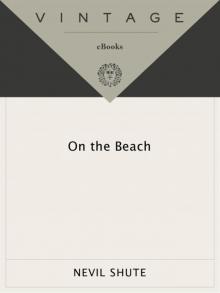 On the Beach
On the Beach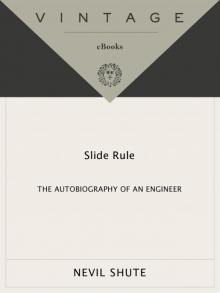 Slide Rule
Slide Rule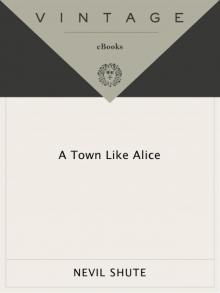 A Town Like Alice
A Town Like Alice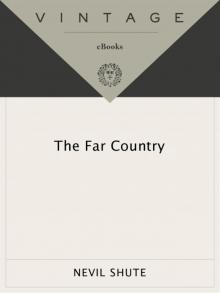 The Far Country
The Far Country Pied Piper
Pied Piper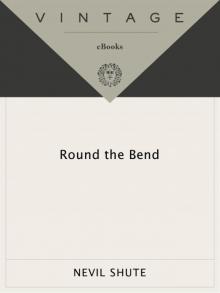 Round the Bend
Round the Bend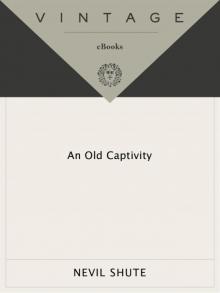 An Old Captivity
An Old Captivity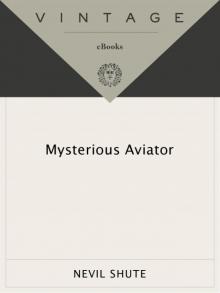 Mysterious Aviator
Mysterious Aviator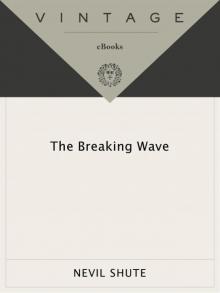 The Breaking Wave
The Breaking Wave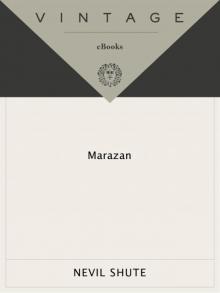 Marazan
Marazan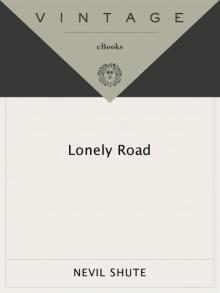 Lonely Road
Lonely Road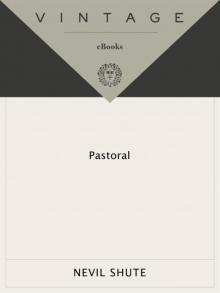 Pastoral
Pastoral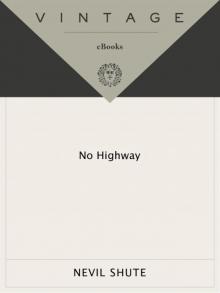 No Highway
No Highway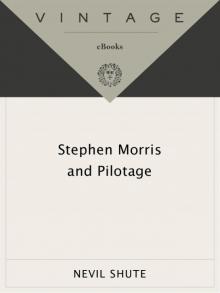 Stephen Morris and Pilotage
Stephen Morris and Pilotage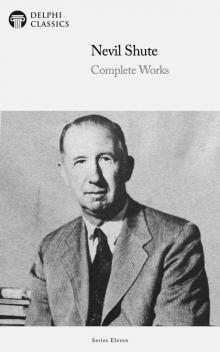 Complete Works of Nevil Shute
Complete Works of Nevil Shute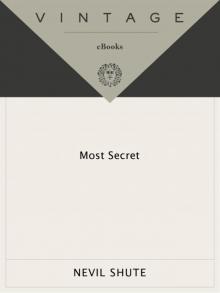 Most Secret
Most Secret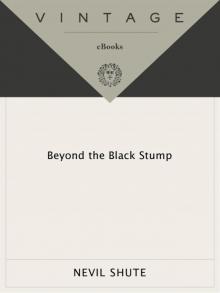 Beyond the Black Stump
Beyond the Black Stump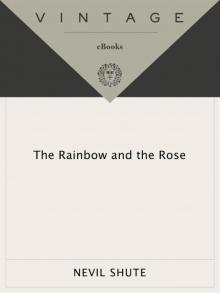 The Rainbow and the Rose
The Rainbow and the Rose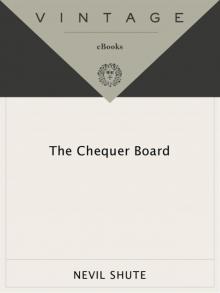 The Chequer Board
The Chequer Board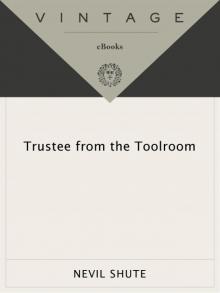 Trustee From the Toolroom
Trustee From the Toolroom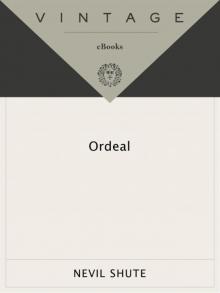 Ordeal
Ordeal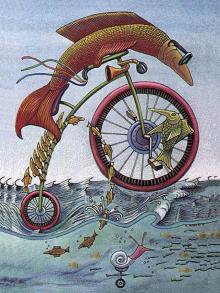 Stephen Morris
Stephen Morris